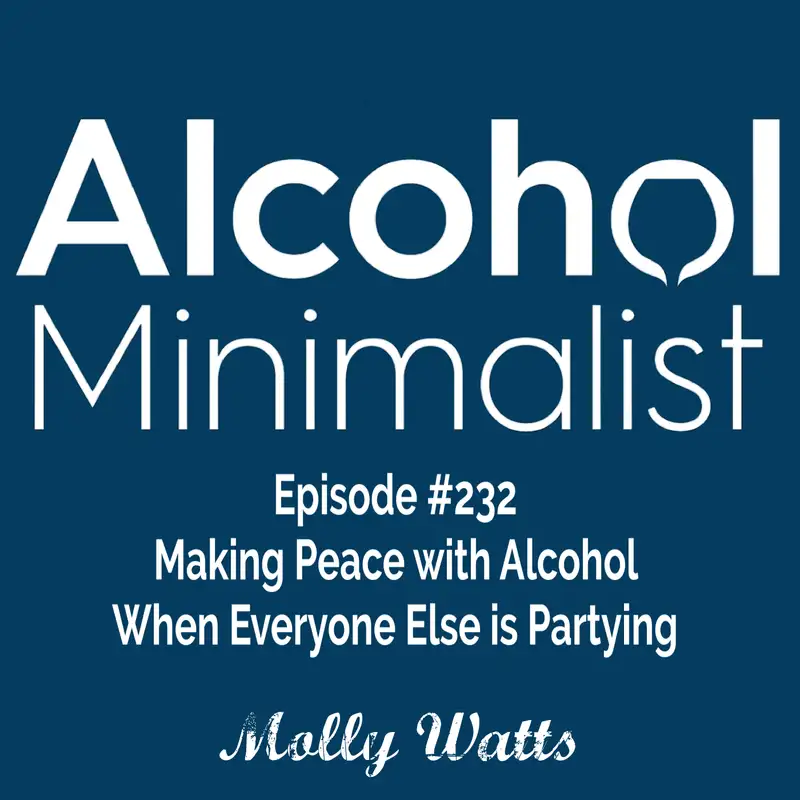Making Peace with Alcohol When Everyone Else is Partying
Episode Summary
In this episode of The Alcohol Minimalist Podcast, Molly dives into one of the most challenging but common scenarios: staying committed to your goals when everyone else around you is celebrating with alcohol. As summer ramps up—bringing with it weddings, barbecues, vacations, and concerts—the social pressure to drink can feel stronger than ever.
Molly explores the neuroscience behind our desire to fit in, how FOMO (Fear of Missing Out) hijacks our behavior, and why choosing intentionality over impulsivity can feel so hard—but is absolutely doable. She shares mindset tools, practical planning strategies, and science-backed techniques to help you enjoy life fully without sacrificing your peace or self-trust.
What You’ll Learn in This Episode:
- Why our brains are wired for social belonging—and how that impacts drinking decisions
- What Solomon Asch’s conformity studies reveal about peer pressure
- How FOMO combines scarcity and shame (and how to spot it)
- Ways to shift your thinking from “missing out” to “building something better”
- Four brain-based tools you can use to feel more confident at social events
- The power of novelty in rewiring the brain’s reward system
- How to ground yourself in the moment and align with your long-term goals
Tools & Concepts Discussed:
- Play the Movie to the End – visualizing the real outcomes of drinking off-plan
- If–Then Planning – a simple framework to prepare for triggers ahead of time
- Distanced Self-Talk – how using your name can help regulate your emotions
- Grounding Techniques – practices to stay present and calm in the moment
- The Behavior Map – Alcohol Minimalist’s foundational tool for change
- Novelty as a Catalyst – why small, intentional changes can shift how you feel
- Identity-Based Decisions – aligning your choices with who you are becoming
Referenced Think Thursday Episode:
- “The Brain Loves Novelty—Use It to Reinvent Summer” — a short companion episode on how newness boosts engagement, motivation, and brain health.
Mentioned Resources:
Takeaway Quote:
“Peace isn’t about perfect behavior. It’s about aligned behavior. It’s about becoming someone who desires alcohol less—even when the world around you doesn’t.”
If this episode resonated with you, share it with someone you love. And remember: peace is the goal—not perfection.
Low risk drinking guidelines from the NIAAA:
Low risk drinking guidelines from the NIAAA:
Healthy men under 65:
No more than 4 drinks in one day and no more than 14 drinks per week.
Healthy women (all ages) and healthy men 65 and older:
No more than 3 drinks in one day and no more than 7 drinks per week.
No more than 3 drinks in one day and no more than 7 drinks per week.
One drink is defined as 12 ounces of beer, 5 ounces of wine, or 1.5 ounces of 80-proof liquor. So remember that a mixed drink or full glass of wine are probably more than one drink.
Abstinence from alcohol
Abstinence from alcohol is the best choice for people who take medication(s) that interact with alcohol, have health conditions that could be exacerbated by alcohol (e.g. liver disease), are pregnant or may become pregnant or have had a problem with alcohol or another substance in the past.
Abstinence from alcohol is the best choice for people who take medication(s) that interact with alcohol, have health conditions that could be exacerbated by alcohol (e.g. liver disease), are pregnant or may become pregnant or have had a problem with alcohol or another substance in the past.
Benefits of “low-risk” drinking
Following these guidelines reduces the risk of health problems such as cancer, liver disease, reduced immunity, ulcers, sleep problems, complications of existing conditions, and more. It also reduces the risk of depression, social problems, and difficulties at school or work.
Following these guidelines reduces the risk of health problems such as cancer, liver disease, reduced immunity, ulcers, sleep problems, complications of existing conditions, and more. It also reduces the risk of depression, social problems, and difficulties at school or work.

